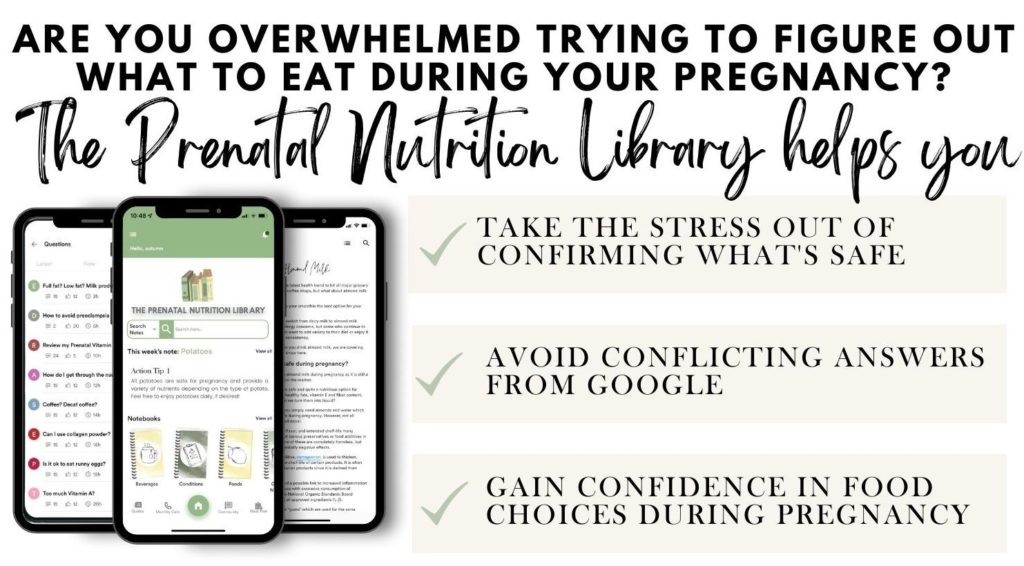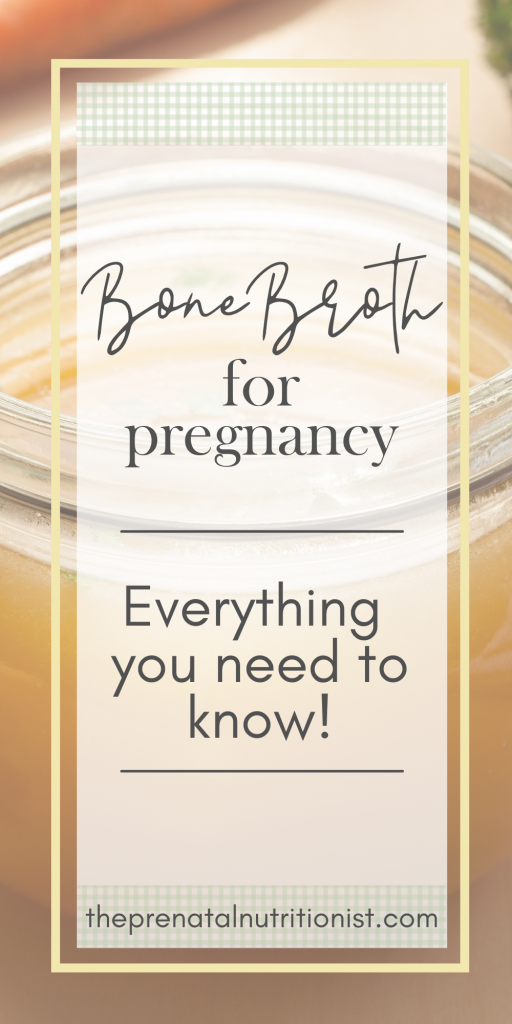
Expectant mothers have so much on their minds. There’s the excitement of meeting your soon to be baby, preparing for motherhood, preparing for birth, and of course, everything associated with growing a healthy baby. Pregnant women are constantly considering the up and downsides of every food for their little one growing inside them. Which is normal! There is a lot to consider.
Pregnant women should consume a healthy variety of vitamins and nutrients for a healthy pregnancy and smooth delivery. You need to hit all the food groups. A well-balanced diet with trace minerals like calcium, potassium, magnesium, and iron, folate, Vitamin A, B, C, D, E, the list goes on and on! Plus, don’t forget hydration!
Collagen-rich foods are especially important for meeting your daily nutrient requirements for proper health of both you and your growing baby. Collagen is the most abundant protein in your body and glycine is the most abundant amino acid in collagen. Collagen is made by combining glycine and another amino acid proline with the help of vitamin C!
Glycine is an amino acid (the building blocks of protein) that becomes conditionally essential during pregnancy which means prior to being pregnant your body could make enough on its own, but now you have to obtain it through food in order to have adequate amounts for you and baby.
Additionally, glycine is involved in the function of choline, folate, and vitamin B12. Collagen, and therefore glycine, supports so many aspects of pregnancy from daily energy and mood, to fetal development, to labor and delivery, even recovery (plus its great for your skin, hair, and nails)! Glycine is an amino acid in bone broth!
Today I want to talk about one of the best ways to get collagen in your diet that doesn’t rely on supplements, drinking bone broth while pregnant!
The Benefits of Drinking Bone Broth While Pregnant
So, what is bone broth?
Bone broth is a broth made from animal bones. Bone broth can be made by simmering animal bones such as pork, beef, chicken, turkey, bison, fish, etc. down into drinkable liquid. It’s a prehistoric method for consuming animals and a fantastic addition to your pregnancy diet, especially when morning sickness strikes and you don’t feel like eating a heavier meal.
Below are the health benefits of adding bone broth to your pregnancy diet and how to make your own bone broth.
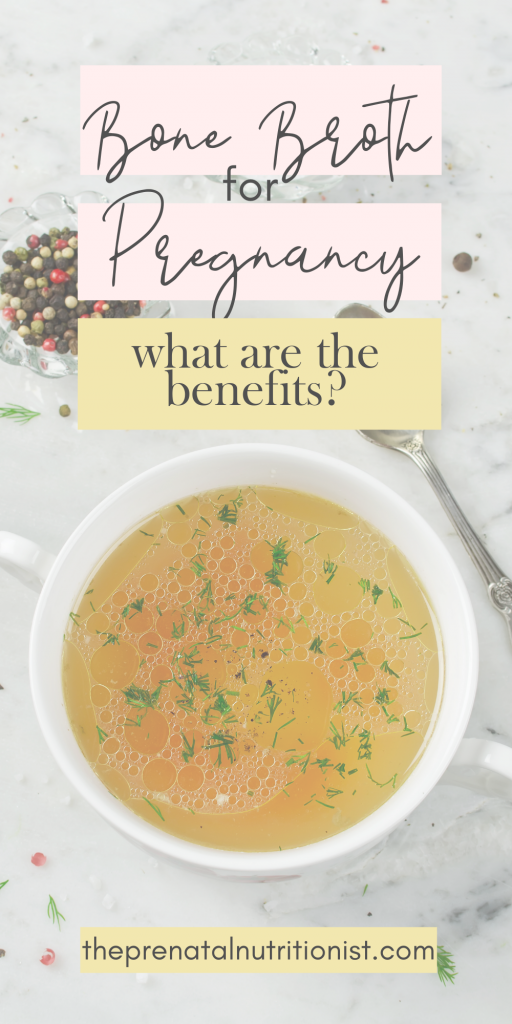
It’s a nutrient-dense food.
This food is truly rich in minerals, protein, certain amino acids, gelatin, and collagen! Drinking bone broth brings you one step closer to meeting your daily intake of protein, carbs, fat, calcium, magnesium, phosphorus, glycine, zinc, iron, boron, manganese, and selenium, as well as omega-3 fatty acids. Bone broth is PACKED full of nutrients which are wonderful for overall health and pregnancy health.
Bone broth helps improve digestion & gut health.
In fact, bone broth helps with your digestion, thanks to the beneficial impact that it has on your gut health. Collagen-rich foods are one piece to maintaining a healthy gut microbiome and providing your unborn baby with the necessary nutrients during fetal development. Bone broth contributes to the betterment of your gut health and the optimal nutrient absorption and transferral to the baby.
Drinking bone broth boosts your immune system.
Drinking bone broth regularly can improve your immune system over time. The amino acids and anti-inflammatory components of this food make it a serious immunity booster which is something you can never get enough of especially when pregnant. Drink a cup of bone broth a day to prevent any nasty colds and to even shorten sicknesses!
Since bone broth contains B vitamins like B12 and B2 it can also benefit your nervous system. This is great if you are experiencing any nerve pain during pregnancy.
Bone broth helps build strong bones.
Calcium is one of the main minerals that a baby needs during pregnancy in order to develop strong and healthy bones of their own. These nutrients, if not found or obtained from the mom’s nutrient reserves, are often absorbed from the mother’s bones. You do not want that to happen!
While calcium content varies widely depending on the bones used, bone broth can be a simple way to up your calcium intake, especially if you are lactose intolerant.
Drinking bone broth can reduce signs of stretch marks.
It’s no secret collagen is essential for healthy glowing skin, but it also helps with stretch marks. Collagen is great for keeping your skin healthy and happy while your belly ( and boobs ) grow. Collagen promotes skin elasticity and therefore can help reduce the chances of gaining stretch marks and can also help heal them if you do get them (it is mostly genetics!).
You can fight nausea and morning sickness with bone broth.
Luckily, for any expectant mothers suffering from morning sickness, drinking bone broth regularly can help you whenever morning sickness strikes. It’s so nutrient-dense and easy to digest, it can re-hydrate you and help soothe your stomach plus provide protein when it is hard to eat meat. You can also drink bone broth to keep your energy levels high even if you don’t feel well enough to eat a solid meal.
If you are dealing with other gastrointestinal issues be sure to check out this article. It covers all of the uncomfortable GI symptoms related to pregnancy and shares with you other great foods to incorporate into your diet especially while you are pregnant!
Bone broth helps keep joints strong.
Once again, all of the nutrients and large amounts of collagen in bone broth aid in strong, healthy, and durable joints. Your joints are strained to the max during pregnancy due to tons changes that prepare your body for labor. So any food that helps keep your bones and joints happy is a must!
Bone broth can help with proper thyroid function.
Bone broth made from fish contains a good level of iodine. This particular nutrient is essential for a healthy metabolism and thyroid function.
Collagen is another component known for helping manage thyroid problems. Iodine and collagen are two great nutrients found in bone broth that contribute to the health of your thyroid.
If that’s not enough for you, bone both also contains amino acids like glutamine. Glutamine is essentially molecules that play a huge role in improving gut health too!
Drinking bone broth can help with postpartum healing.
Okay, you got me, this isn’t technically a “during pregnancy” benefit, but it’s still worth mentioning. Drinking bone broth during and after pregnancy can make the healing process a little bit easier. Here’s why, as we mentioned above bone broth is packed full of collagen and nutrients, which overall help your body feel well and heal.
However, collagen in particular helps heal wounds from labor, childbirth or a cesarean section. It aids to rebuild your uterus tissue, pelvic floor, and abdominal muscles. It can even aid in restoring stretched out skin!
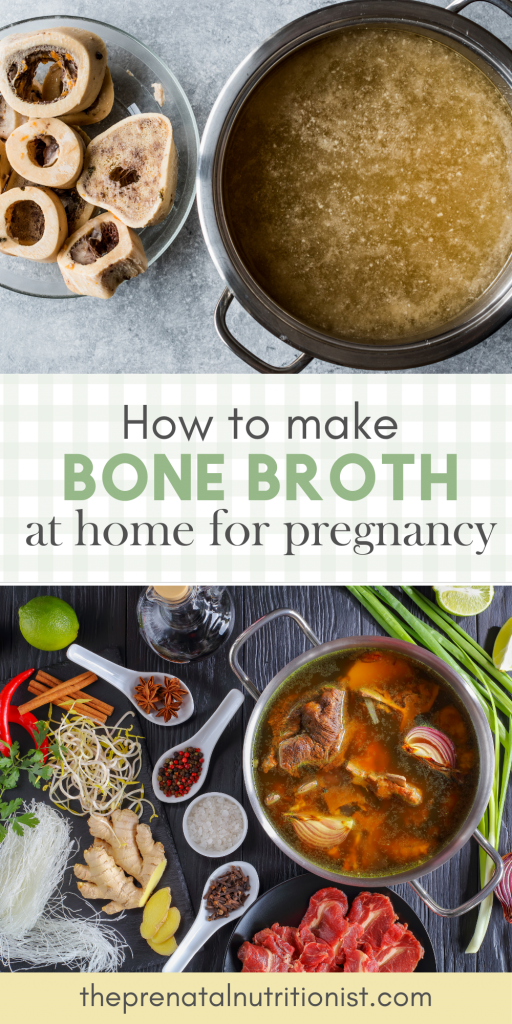
How To Make Bone Broth At Home
Pick a quality bone for your broth:
It’s important to choose the best bone possible. You want your broth tasty just as much as you want to select top quality. It’s also important to choose a mix of different bone types too. Knuckle, neck, marrow, shanks, and oxtails are all solid choices. You should also pick grass-fed beef bones, and pasture-raised or free-range poultry bones. Because the broth will go inside your body and feed your unborn baby, it’s better to keep it all at the highest quality!
Roast the bones before making the broth:
This step will ensure you get the best flavor from the bones. Of course, if you have leftover bones from any meat preparations, you can just use them instead and skip this step. If not, definitely roast them! You should roast them at 425°F for 25-30 minutes, until golden or brownish.
Prepare the tasty mix to soak the bones:
You should line up any veggies that you want in the mix, as well as a few aromatic herbs, salt, and apple cider vinegar. This last ingredient is key to help the bones release all of their nutritional content, so make sure not to skip it. Leave the mixture to soak for about 30 minutes before proceeding with the next step.
Cook your bone broth:
If you’re using an instant pot, just fill the pot with water until it covers the bones by a little past an inch. Then set to cook at slow pressure for 30 to 40 minutes. With a slow cooker, the process is lengthier. You should place the mixture on the basin, cover it with water by about an inch, and let it rest for 30 minutes. Then, you have to cook it for 24 to 48 hours, depending on the bones.
Finally, to make stovetop bone broth, you should place the mixture in a large soup pan or Dutch oven. Make sure to fill it with water and cover the bones by an inch. Let it rest for 30 minutes. Then bring it to simmer over medium to high heat, and immediately reduce the heat to the lowest setting. Cover the lid and cook for 24 to 48 hours.
Strain the broth:
You should strain the bone broth with a fine-mesh sieve and then separate it into jars for proper storage. Keep it in the fridge (or freezer) until it’s time to drink!
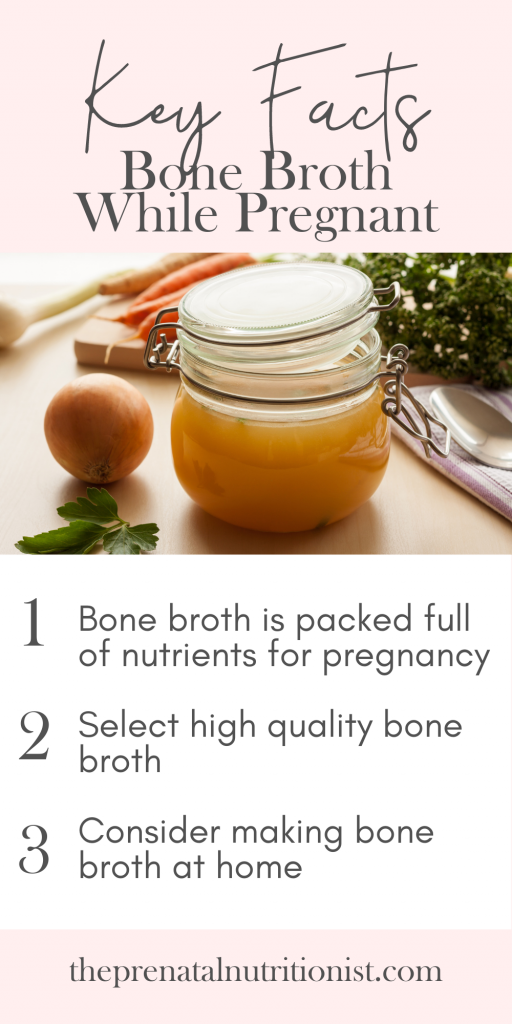
Will you be making bone broth during your pregnancy?
As you can see, we really love the idea of adding bone broth to your pregnancy diet! So, you can definitely feel comfortable including this food in your diet as an expectant mother. The benefits speak for themselves.
Bone broth can be tasty and versatile when eaten next to starchy foods or fresh veggies. You can easily add it to a multitude of dishes! Make a soup, drink it straight, or add spices on the go depending on what your cravings are. Either way, bone broth is a safe, tasty, and a healthy way to consume your nutrients and calories during pregnancy even when morning sickness strikes.
You can learn more about glycine and collagen, why they are important, where to get it in your diet, and how much you need to have a feel-good pregnancy in The Prenatal Nutrition Library!



